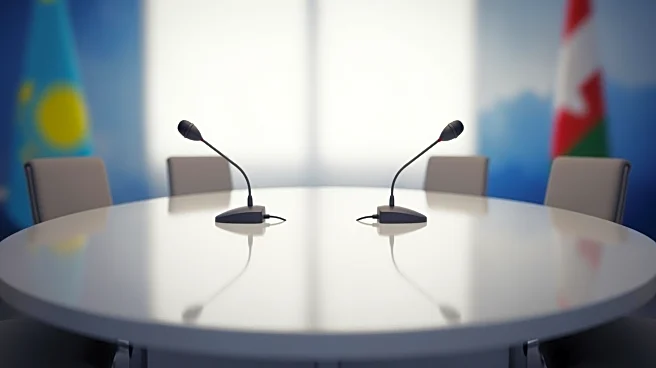What's Happening?
The Kremlin is advocating for an early meeting between U.S. President Donald Trump and Russian President Vladimir Putin to address the ongoing conflict in Ukraine. Despite previous attempts to broker peace,
Russia has maintained its firm stance, leading to frustration for President Trump. The proposed summit aims to facilitate diplomatic negotiations, although significant preparatory work is required. Russia's demands include Ukraine's demilitarization, neutrality, and recognition of Russian control over seized territories. The U.S. has applied pressure through sanctions and threats of increased military support for Ukraine.
Why It's Important?
An early Trump-Putin meeting could potentially alter the course of the Ukraine conflict, impacting international relations and security dynamics. Successful negotiations may lead to a ceasefire, reducing tensions and stabilizing the region. However, Russia's demands pose challenges, as they conflict with Ukraine's sovereignty and Western interests. The meeting's outcome could influence U.S.-Russia relations, affecting global geopolitical strategies and alliances. Additionally, the conflict's resolution may impact economic sanctions and international trade, with potential repercussions for global markets.
What's Next?
Preparations for the Trump-Putin summit are underway, with both sides seeking favorable conditions for successful negotiations. The U.S. may continue to apply diplomatic and economic pressure on Russia to encourage concessions. The international community will closely monitor developments, as the meeting's outcome could influence future diplomatic efforts and security policies. Stakeholders, including European nations and NATO, may react to the summit's progress, adjusting their strategies accordingly.
Beyond the Headlines
The potential meeting underscores the complexities of international diplomacy, highlighting the challenges of balancing national interests with global security. It raises ethical questions about negotiating with aggressive states and the implications for international law and human rights. The summit may also influence public perceptions of leadership and foreign policy, shaping political narratives and voter sentiments.









